Artificial Intelligence (AI) is the most transformative technologies according to CEOs like Sundar Pinchai.1
Generative AI models are facilitating numerous tasks, enabling efficiency and automation. ChatGPT is the prominent generative AI Large Language Model (LLM) and receives 1.7 billion visits/month.2
ChatGPT has various applications that are useful to people, companies, and industries. We explain the top 50 ChatGPT use cases. If you want to use your own company’s data for generative AI, you can look into training or fine-tuning LLMs.
General ChatGPT Use Cases
Structured Tasks with ChatGPT
ChatGPT can effectively assist in handling structured tasks that require consistent formatting, predefined outputs, or repetitive workflows. This capability is particularly beneficial when accuracy, clarity, and adherence to a set structure are critical.
- Data Entry and Management
ChatGPT can help streamline data entry tasks by processing raw inputs and converting them into structured formats like tables, spreadsheets, or databases. For example, it can standardize customer details or summarize product information for e-commerce listings. - Template-Based Responses
In customer support or communication, ChatGPT can generate responses based on predefined templates, ensuring uniformity and professionalism. - Document Generation
It can assist in creating reports, contracts, or other professional documents by populating templates with user-provided data or generating complete drafts following specified guidelines. - Workflow Automation
ChatGPT can guide users through structured workflows, such as completing forms, onboarding new employees, or processing compliance-related checklists. - Content Structuring
ChatGPT can organize content into logical sections for tasks like article writing or report creation, ensuring coherence and readability.
> Textual Applications
ChatGPT, as a language model, can be used for a wide range of text-based use cases. Some of the most common use cases of ChatGPT include:
1- Content creation
ChatGPT can be used to generate high-quality content for websites, blogs, or social media platforms in a few seconds. This includes creating content like:
- Product description
- Blog post
- Social media post
- Draft for a business idea
- Long form content like entire articles
It can also be used for creative writing applications, where it can help users generate unique ideas, brainstorm plots, and even write entire stories.
Figure 1. Example of a content creation using ChatGPT with the prompt “Once upon a time”

Real Life Example
Koo, a social media platform, uses GPT models to assist users in generating high-quality content at scale. This includes creating blog posts, social media content, and more. By integrating ChatGPT, Koo aims to boost user engagement by enabling users to create content faster without sacrificing quality.
2- Translation
ChatGPT can be used for translation services, where it can automatically translate text from one language to another.
A great real-life example of ChatGPT being used in translation comes from Spotify and Duolingo. Both companies have integrated ChatGPT to enhance their multilingual customer support.
For example, Spotify uses ChatGPT to provide customer support in over 60 languages. ChatGPT translates and responds in the customer’s preferred language, whether a customer asks questions about playlists, features, or account issues, making the support experience seamless3 .
Similarly, Duolingo leverages ChatGPT to answer customer inquiries in over 30 languages, ensuring that users worldwide can communicate about their courses, app settings, and other concerns without language barriers.
3- Conversational AI
ChatGPT can be used to create intelligent chatbots that can converse with users in natural language. These chatbots can be used for customer service, sales, or support to produce human-like responses, as well as for personal virtual assistants.
4- Knowledge discovery
With retrieval-augmented generation, businesses can feed relevant information to ChatGPT from their databases. With this data, ChatGPT can inform employees using that company’s private data, helping them discover business information using natural language.
> Coding Applications
For further details, see our article: How to Use ChatGPT for Business
5- Writing code
ChatGPT can write code for simple or repetitive tasks, such as file I/O operations, data manipulation, and database queries. However, it’s important to note that its ability to write code is limited, and the generated code may not always be accurate, optimized, or desired output.
Figure 2. ChatGPT writing code for a comment
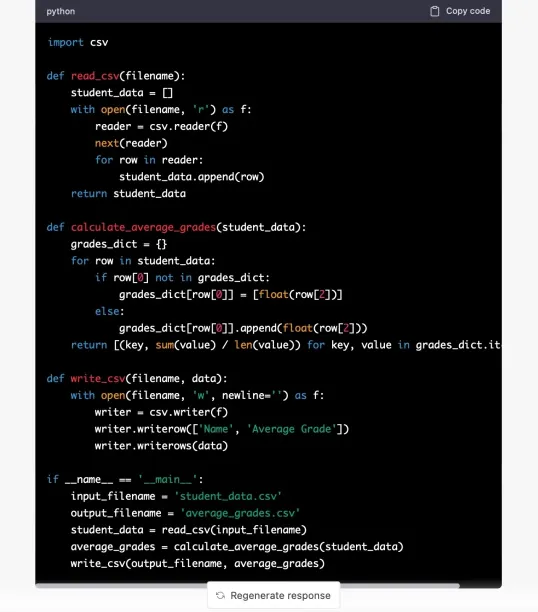
6- Debugging
ChatGPT’s bug-fixing abilities can also be a valuable tool for programmers. It can assist in debugging code by proposing possible causes of errors and presenting solutions to resolve them.
Figure 3. ChatGPT helps with debugging code
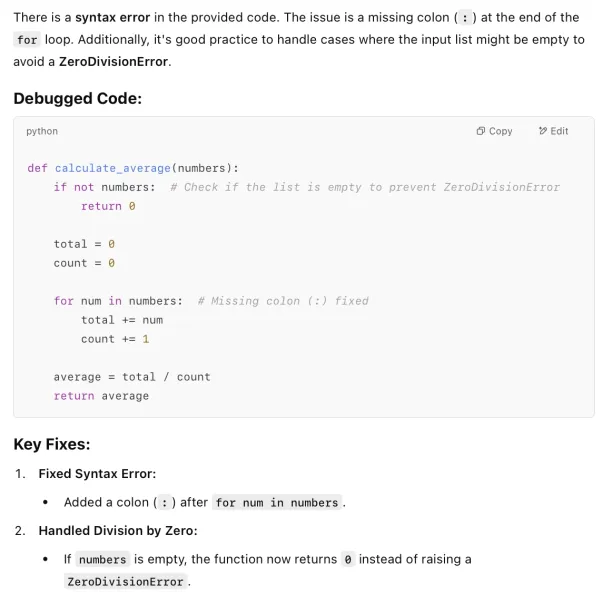
7- Code completion
ChatGPT can aid in code completion by anticipating the following lines or segments of code based on the context and current code. This can be particularly advantageous for programmers who may not recall all of the syntax and functions of the programming language they are using, saving time and effort.
8- Code refactoring
ChatGPT can recommend methods to enhance and refine the code structure, readability, and performance. Refactoring entails modifying existing code to improve its quality without altering its behavior. ChatGPT can offer suggestions for renaming variables, removing repetitive code, and other enhancements that can make the code more effective and accessible for other programmers to understand.
Figure 4. ChatGPT refactoring the code it provides as an example
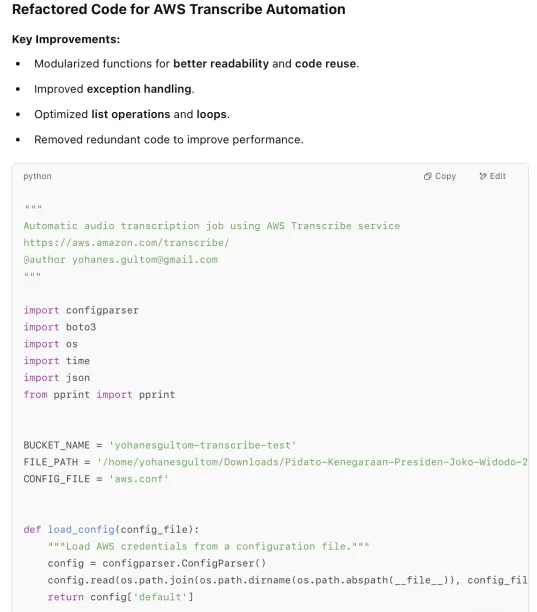
9- Code documentation
When a programmer enters their code into ChatGPT, it can propose suitable documentation templates based on the programming language and the kind of code being documented. For instance, if the code is a function, ChatGPT can propose a function documentation template that includes parameters, return values, and a description of the function’s objective.
Figure 5. ChatGPT provides example code documentation for a Python function that sorts a list of numbers in ascending order
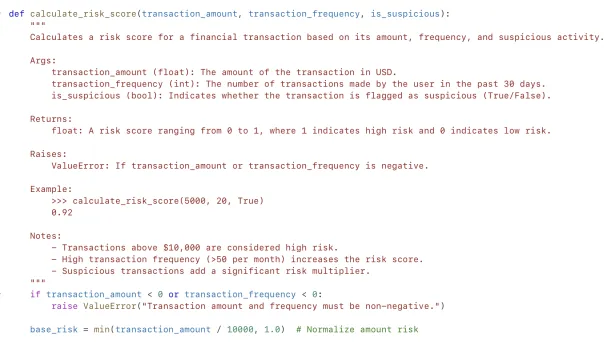
10- Code snippets generation
ChatGPT has the potential to produce code snippets in multiple programming languages based on user input and requirements. A code snippet is a brief piece of code that exemplifies a particular feature, function, or technique in a programming language. It can help illustrate how to execute a specific task or resolve a problem in code and serve as a foundation for more intricate programming projects.
Figure 6. ChatGPT provides an example code snippet

11- Explaining coding techniques and concepts
ChatGPT can provide explanations and examples of programming concepts, software products, syntax, and functions, which can help people learn and understand programming languages. This can be particularly useful for beginner programmers who may be unfamiliar with programming concepts or experienced programmers who are working with a new programming language.
Figure 7. ChatGPT explains the question, “What is object-oriented programming, and how does it work?”
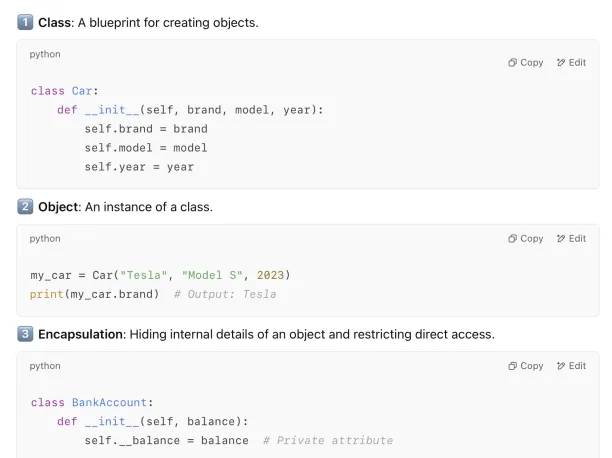
>Audiovisual Applications
In September 2023, OpenAI rolled out multi-modal capabilities to ChatGPT, including image processing.4
Real Life Example
Runway, a creative AI platform, uses GPT models to assist content creators in generating video scripts. This application is particularly useful for social media marketers who need to produce engaging video content rapidly5 .
12- Classify images
ChatGPT models can classify images into categories such as landscapes, animals, objects, etc. This is commonly used in medical imaging (e.g., classifying X-rays), e-commerce (e.g., classifying product images), and more.
13- Identify objects in images
ChatGPT can recognize specific objects in images, such as faces, cars, or everyday objects. This technology is widely used in security (e.g., facial recognition), autonomous vehicles (e.g., recognizing pedestrians), and retail (e.g., analyzing shelf inventory).
14- Transcription
ChatGPT can convert spoken words into text, making it useful for applications like meeting transcriptions, podcast indexing, and legal documentation.
15- Text-to-speech
ChatGPT can convert text into natural-sounding speech, used in accessibility technologies, virtual assistants, and educational tools.
16- Speech-to-speech
ChatGPT can translate spoken language into another spoken language in real time, facilitating communication across language barriers in customer service, international business, and travel.
Business-function-specific ChatGPT Use Cases
> Customer Service Applications
For more real-life examples, see our article: ChatGPT for Customer Service: 7 Use Cases & Real Life Examples
17- Multilingual customer support
The multilingual support provided by ChatGPT for customer service involves leveraging the large language model’s capabilities to offer assistance to customers who speak different languages. ChatGPT can be trained in a range of languages, and it has the potential to translate messages from one language to another, enabling effective communication between customers and businesses in different languages.
Figure 18. An exemplary multilingual customer response generated by ChatGPT

18- Personalized responses to customer queries
ChatGPT can be trained on customer data, such as:
- Past purchases
- Chat history
- Customer feedback
to create a personalized profile for each customer. When a customer sends a message, ChatGPT can use this profile to provide relevant responses tailored to the customer’s specific needs and preferences.
Real Life Example
Octopus Energy uses GPT-powered chatbots to handle 44% of customer inquiries. This automation has reduced the need for human intervention, effectively replacing the work of approximately 250 support staff. The system handles queries ranging from billing to account management6 .
19- Quick responses to customer inquiries & complaints
ChatGPT can be trained to detect and reply to typical customer complaints, such as problems with product quality, shipping delays, or billing errors. When a customer submits a complaint, ChatGPT can evaluate the message and offer a response acknowledging the customer’s concerns and presenting possible solutions to the issue.
Real Life Example
Salesforce integrates Einstein GPT, a tool that helps sales teams draft personalized emails and responses based on CRM data. This automation improves customer interactions and streamlines communication processes, allowing sales teams to focus more on high-value tasks7 .
20- Creating emails for customers
ChatGPT can design custom email templates for specific customers using provided customer data. When a company needs to send an email to a customer, ChatGPT can utilize a template to create an email that is personalized to the customer’s specific interests and requirements.
21- Sentiment analysis
Sentiment analysis is used to identify customers who are unhappy or dissatisfied with a product or service and to take steps to address their concerns before they escalate.
ChatGPT can be trained to recognize a wide range of emotions, including happiness, sadness, anger, and frustration. When a customer sends a message, ChatGPT can analyze the message to determine its sentiment and provide a response that is tailored to the customer’s emotional state.
For more information on sentiment analysis using ChatGPT, read Examples of ChatGPT Sentiment Analysis.
For more information on sentiment analysis comparison on AI-tools, read Sentiment Analysis Benchmark Testing: ChatGPT, Claude & DeepSeek.
22- Replying to customer reviews
When a customer leaves a review or comment on online review platforms or your website, ChatGPT can generate a response that addresses the customer’s concerns and offers potential solutions or assistance.
23- Answering FAQs
ChatGPT can be trained on a company’s FAQ page or knowledge base to identify and respond to frequent customer inquiries. When a customer submits a question, ChatGPT can examine the message and offer a response that addresses the customer’s inquiry or guide them to additional resources that may be useful.
To learn more about ChatGPT in customer service, check our article.
> Data collection
Web contains the largest dataset and ChatGPT facilitates web data collection. Use cases include:
24- Generate code for scraping websites
AI tools like GPT-based models can generate Python code for scraping websites using libraries like BeautifulSoup, Scrapy, or Selenium. These models can automatically write code to extract specific data such as prices, product descriptions, or news articles, making it easier for non-developers to gather web-based information.
25- Clean extracted data
26- Process extracted data
For more, check out ChatGPT use cases in web scraping.
> Educational Applications
For teachers:
27- Course content creation
ChatGPT can assist teachers in developing innovative ideas for lesson plans, activities, and projects that are in line with defined educational goals and curriculum guidelines. Teachers can employ ChatGPT to produce and organize instructional content, including but not limited to:
- Presentations
- Worksheets
- Quizzes (Figure 20)
- Other educational materials customized to meet their students’ individualized requirements
Figure 20. ChatGPT creates a quiz for a class
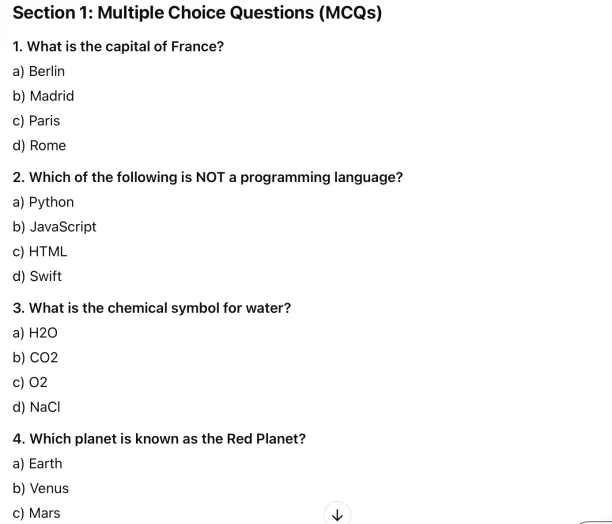
28- Grammar and writing check
Another application of ChatGPT for educators involves utilizing its natural language understanding capabilities to aid in assessing and enhancing written work. This can be implemented in various ways:
- Proofreading and editing
- Providing feedback to students
- Teaching writing skills
29- Grading
ChatGPT can help teachers grade student essays by evaluating their content, structure, and coherence. AI can offer feedback on grammar, spelling, punctuation, and syntax while also assessing the quality of the argument or analysis presented. Nonetheless, it is vital to avoid solely relying on ChatGPT for grading purposes. Instead, teachers should have a critical process and employ ChatGPT to create the rubric used for grading.
30- Designing syllabus outline
Incorporating ChatGPT in their teaching approach, educators can harness the AI’s potential to aid in the creation, organization, and structuring of course content coherently and efficiently (Figure 21). Some ways in which ChatGPT can help include:
- Developing course objectives and goals
- Generating topics for the course
- Planning lessons
- Identifying and assembling relevant resources and materials for the course
For students:
31- Help with homework
ChatGPT can be useful for students in many aspects of their homework, such as:
- Answering questions (Figure 10)
- Problem-solving
- Concept reinforcement
- Improving writing skills
Figure 21. ChatGPT explains some key concepts for a high school student

32- Research assistance
ChatGPT can be an asset in supporting and streamlining the research process for academic projects, assignments, or personal interests. It can assist in many steps involved in the research process, such as:
- Topic selection
- Background information about the topic
- Identifying relevant resources
- Organizing research
- Citation assistance
33- Language learning
ChatGPT can be a valuable tool for language learning. It offers translations, grammar explanations, vocabulary practice, and conversation simulations to help students practice and improve their language skills. It can also help students schedule a program for improving their language skills (Figure 24).
Figure 24. ChatGPT creates a weekly schedule for language learning practices
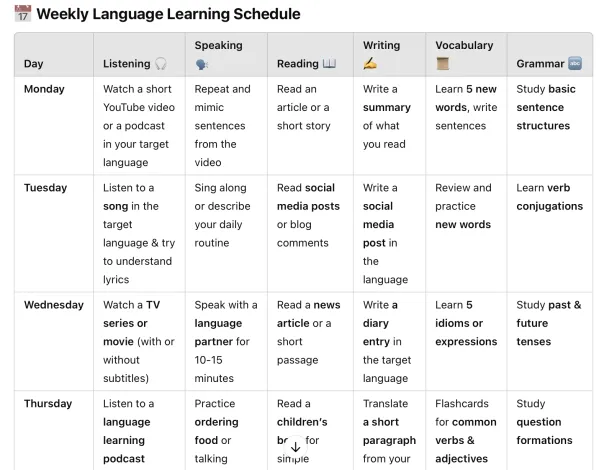
> Marketing & SEO Applications
34- Content creation for content marketing campaigns
AI-generated texts have numerous applications in marketing beyond the generation of business ideas, including:
- Content creation such as emails, social media posts, blog article,s etc. for content marketing
- Scriptwriting and storytelling for advertising goods and services, creating compelling stories and persuasive messages.
35- Personalization of customer experience
By leveraging its natural language processing (NLP) capabilities, ChatGPT can generate personalized content for customers that takes into account their preferences, past behavior, and demographics. This enables businesses to create targeted content that connects with their audience on a more personalized level, resulting in higher levels of engagement and conversion rates.
36- Audience research
Audience research involves collecting information and insights about the target audience to gain a better understanding of their interests, preferences, behaviors, and requirements. This helps companies with more effective marketing.
ChatGPT can be used to analyze customer data such as:
- Search queries
- Social media interactions
- Past purchases to identify patterns and trends in customer behavior
37- Writing product descriptions
Product descriptions are a fundamental aspect of marketing that furnish potential customers with information about a product’s features, benefits, and value. ChatGPT can assist in crafting engaging and informative product descriptions that align with the interests and preferences of the target audience.
38- Chatbot for customer support
Indeed, ChatGPT can be incorporated into a chatbot to deliver prompt and personalized customer support. Chatbots in marketing can address customer inquiries, offer technical support, and troubleshoot issues, among other things for marketing purposes.
39- Creating customer surveys
ChatGPT can help with creating customer surveys:
- Question generation
- Organizing survey structure
- Making surveys multilingual with its translation ability
- Survey analysis
To learn more about ChatGPT in marketing, check our article.
SEO
40- Generate topic ideas for content writing
ChatGPT can be used for generating topic ideas for SEO content writing by utilizing its language processing capabilities to:
- Produce relevant keywords and phrases
- Analyze competitors’ content to identify gaps in coverage
- Suggest topics based on current trends and user search queries
41- Conduct keyword research
Integrating relevant keywords into content is a vital component of a successful SEO strategy, as it helps identify the words and phrases that potential customers use when searching for products or services associated with the website’s offerings.
ChatGPT can perform functions in keyword search optimization, such as:
- Generating keywords
- Identifying keyword trends
42- Find the right titles
ChatGPT can aid in crafting captivating and SEO-friendly titles by blending its language generation abilities with its knowledge of SEO best practices. It can produce SEO-friendly titles by guaranteeing that the titles are:
- Descriptive and clearly convey the topic of the content
- Capable of incorporating relevant keywords that are related to the topic
- Concise and to the point, typically falling within the 60-70 character limit for optimal display in search engine results pages.
- Eye-catching and likely to attract clicks, which can help improve click-through rate (CTR) and ultimately, SEO
Figure 27. ChatGPT SEO-friendly title suggestions for content in B2B marketing
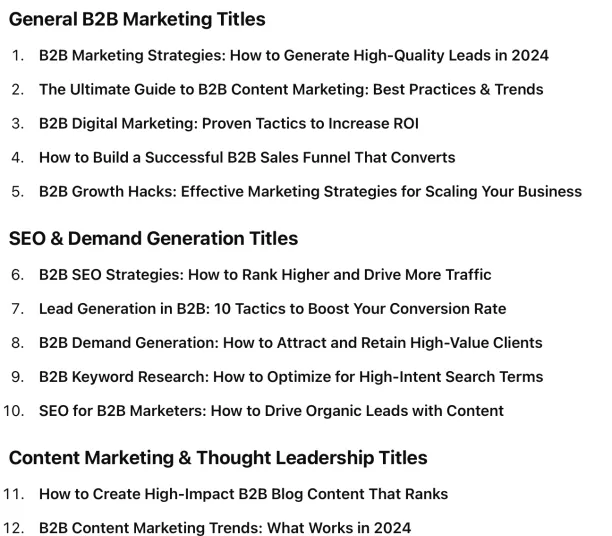
43- Group search intent
ChatGPT can assist in search intent grouping by analyzing search queries and categorizing them based on the user’s intended goal or purpose, thanks to Natural Language Processing (NLP) methods. This can help businesses and marketers understand the intent behind specific search terms and optimize their content and strategies to better meet the needs and expectations of their target audience.
For more on how to use search function of ChatGPT effectively, check our article.
44- Create content structure
ChatGPT can aid in designing content structure by producing outlines and suggesting organization methods for a given topic. This can be advantageous for SEO optimization since well-structured and organized content not only offers a superior user experience but also enables search engines to comprehend the context and significance of the content.
45- Generate meta descriptions
Meta descriptions function as a form of advertisement for a page, enticing users to click on the link and visit the page. Hence, meta descriptions are a significant factor in SEO. ChatGPT can assist in creating effective meta descriptions by generating content summaries that precisely and concisely depict the primary topic of a page.
46- Create sitemap codes
ChatGPT can be used to generate sitemap codes, which produce an XML file that lists all the pages and content on a website.
Figure 28. Example of a simple sitemap code
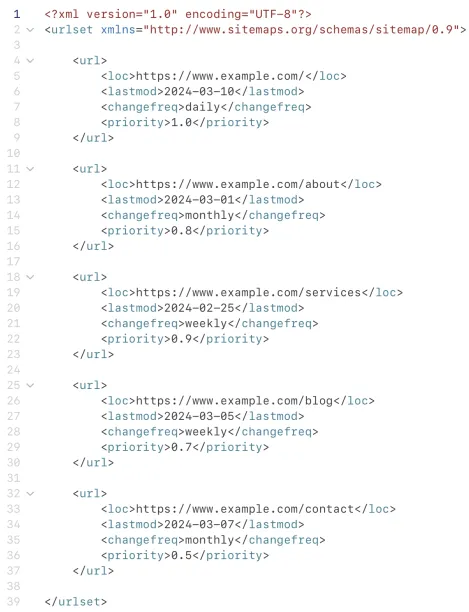
> HR Applications
47- Creating job interview questions
HR departments frequently require a series of questions to ask job candidates during the interview process, which can be a time-consuming task. AI can be utilized to produce interview questions that pertain to the job position and evaluate the candidate’s qualifications, abilities, and experience.
48- Generating onboarding materials
ChatGPT can be used to generate onboarding materials for new employees, such as training videos, handbooks, and other documentation.
49- Job description generation
ChatGPT can be used for creating job descriptions that accurately reflect the required skills and qualifications for a particular position.
50- Answering employee questions
By fine-tuning ChatGPT with your company’s policies, you can have it answer employees’ questions about HR policies.
Conclusion
ChatGPT offers businesses a versatile tool for enhancing operations in customer service, content creation, internal communication, and more. However, when adopting AI tools like ChatGPT, organizations must consider potential challenges, such as data privacy, accuracy, and integration requirements.
External Links
- 1. Google CEO: AI impact to be more profound than discovery of fire, electricity | 60 Minutes - YouTube.
- 2. chat.openai.com Traffic Analytics, Ranking & Audience [June 2025] | Similarweb.
- 3. ChatGPT can now see, hear, and speak | OpenAI.
- 4. ChatGPT can now see, hear, and speak | OpenAI.
- 5. 46 ChatGPT Business Use Cases. Centric Consulting
- 6. AI doing the work of over 200 people at Octopus, chief executive says.
- 7. Salesforce AI — Powerful AI Solutions | Salesforce EMEA.



Comments
Your email address will not be published. All fields are required.